“Ill fares the land, to hastening ills a prey / Where wealth accumulates, and men decay.”
– Oliver Goldsmith, “The Deserted Village” (1770)
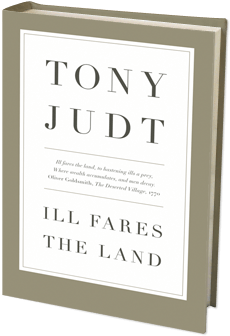 As I will suggest again at the end of this review, it is perhaps appropriate that a Catholic be recommending this book by a secular Jew to a Presbyterian audience. For Judt’s book not only sheds important light on our present economic and political crisis—light often much needed in religious circles—but simultaneously (though perhaps inadvertently) opens space for religious voices to speak out about this crisis as both PC(USA) and Roman Catholicism have sought to do.
As I will suggest again at the end of this review, it is perhaps appropriate that a Catholic be recommending this book by a secular Jew to a Presbyterian audience. For Judt’s book not only sheds important light on our present economic and political crisis—light often much needed in religious circles—but simultaneously (though perhaps inadvertently) opens space for religious voices to speak out about this crisis as both PC(USA) and Roman Catholicism have sought to do.
Many reviewers have called attention to the poignancy of this book, not only in its title theme but also by virtue of its composition. For Judt, a Cambridge and Paris educated historian who settled finally in the U.S., was dying and almost completely paralyzed by Lou Gehrig’s disease when he “wrote” (actually dictated) this book as something of a last testament, especially for the young both here and in Europe. It may, indeed, be a case of urgency focusing further an already first class mind and spirit. For Judt’s earlier writings, especially his magisterial Postwar: A History of Europe Since 1945, had received wide acclaim. Yet it may well be this short, clear, and focused, yet wonderfully rich book (it deserves several readings!) for which he will most be remembered.
___________________________________________
For Judt, a Cambridge and Paris educated historian who settled finally in the U.S., was dying and almost completely paralyzed by Lou Gehrig’s disease when he “wrote” (actually dictated) this book as something of a last testament, especially for the young both here and in Europe.
___________________________________________
The book is a carefully constructed moral argument (in the classical sense that political thought is and must be essentially moral) for the necessary role of state/government in balancing and correcting the irrationalities and destructive consequences of free market economies. It is a moral argument framed within the broad perspective of the last century’s political history—a perspective that reminds most of us (and teaches the young) about the immensely positive role of pre- and post-World War II social democracies (in Europe) and New Deal and “60’s” progressivism (in the U.S.). For those liberal democracies in both Europe and North America employed, until relatively recently, careful but strong government interventions (both for necessary services like education, health, transportation and social security, and for necessary regulation of financial and commercial markets). They used such intervention both to harness and distribute the abundance created by free markets and also to sustain the freedom and justice that countered the destructive utopian dreams of centrally planned (dictatorial) economies. And for much of the 20th Century, such government intervention was (again until relatively recently) supported both by the Left and the Right, by conservatives as much as liberals.
Yet Judt’s book is not a nostalgic call for a return to the liberal social policies of mid-20th Century. Rather it is primarily a sustained critique of the neo-liberal (or neo-conservative) free-market ideology (think Thatcher and Reagan) that over the past thirty years replaced and by now has largely destroyed such social policies and practices. And it is simultaneously a sustained call for the moral imagination needed, in the present crisis of that ideology, to re-think and create anew policies and practices that might again enable the state and government to play a much-needed role in guiding and regulating the market economy towards greater social justice, and thus greater freedom and equality for the many—for “the 99%” as one important current image puts it.
It would be foolish for me to attempt a summary of Judt’s argument, which is rich in thought and reference. Let me, then, just highlight a few central themes before returning to the contribution religion can and should make to his important effort.
___________________________________________
What is needed, then, is both real anger at the consequences of this deliberately trumped-up “free market” ideology and forceful dissent from its amoral narrative. Yet, and here Judt parts company with both the radicals of the 60s and many in the present, there can be no quick recovery from the present destruction of the common good—no imminent revolution.
___________________________________________
As already noted, his argument is primarily historical insofar as it insists that we refuse to forget the tremendous social achievements of the postwar period—the thirty some years between the late 1940s and the mid-1970s. Judt insists that, against the current “free market” idolatry, we proclaim aloud the moral narrative that grounded such widely shared abundance and, far more, nurtured a shared sense of civic faith and purpose in our Western democracies. Again, though, Judt is far from naïve or romantic about those post-war years. For it was their failures, especially their eventual loss of a unifying moral vision (in part due to the radical divisions and hatreds of the “60s”), that gradually allowed the neo-conservative (or neo-liberal) narrative of amoral individualism and greed to capture the public imagination. Yet the time of accounting for the injustices of the last thirty years is at hand, not just because of the Great Recession to which it led, but above all in the increasingly widespread recognition of today’s terrible social and economic inequalities. For it is above all, Judt argues, such inequality and the consequent demise of any shared public faith—destroyed both by the banal brutality of the most powerful and by the despair and violence of the most wretched—that is the heritage of the Thatcher-Reagan-Clinton-Blair-Bush years.
What is needed, then, is both real anger at the consequences of this deliberately trumped-up “free market” ideology and forceful dissent from its amoral narrative. Yet, and here Judt parts company with both the radicals of the 60s and many in the present, there can be no quick recovery from the present destruction of the common good—no imminent revolution. For today, in the present atmosphere of crisis and insecurity, we need to remember the terrible consequences, in the 1930s and 40s, of desperate hope for such quick revolutions, on the Right as much as on the Left. No, what is needed, among many things, is a recovery of real political imagination—the practical imagination to build in today’s circumstances the kinds of policies and programs that might eventually heal present (and very realistic) fears and insecurities and polarizations.
___________________________________________
Careful reading of Judt’s important book might help us to recover and focus our own much-needed voices—a moral vision and language of public faith.
___________________________________________
Even more, though, and this brings me back to the role of religious faith, we need to recover a moral vision and language that will ground and guide such gradual healing and improvement. Judt himself, as a secular European liberal, does not see much role for religion in the re-emergence of this much-needed moral narrative. Yet this blindness on his part (despite occasional positive references to the past significance of religious faith) is one of his book’s few significant weaknesses. For in fact Jews and Muslims and Christians, Protestants and Catholics and Orthodox, can and should contribute in major ways to the re-development of such shared public faith and purpose—perhaps especially in North America, but also in Europe. Yet we religious folk will make that contribution only if we again find the courage to speak strongly our vision and language in the public square. Only if we contest and eventually banish the pseudo-religiosity that today (from both fundamentalists and terrorists, from glib politicians and equally glib pulpits) too often passes for authentic faith in the public arena. Only if we join the common effort to criticize angrily the idol of wealth and strongly proclaim the gospel of our fundamental human equality and community. And only if we also contribute to the difficult prudential and political task of working out the new policies and practices our society and state need today.
We have, as Presbyterians and Catholics, some wonderful and important church teachings on social and political matters; indeed, some quite recent documents which seek to address the common need for renewed public vision and an enriched moral and public discourse. But in general our documents remain too much hidden, even from our congregations. Which is, of course, one of the reasons that someone as intelligent and widely-read as Tony Judt could manage to ignore them. Careful reading of Judt’s important book might help us to recover and focus our own much-needed voices.
Read Kane’s conversation partner, the Rev. Charles Rawlings
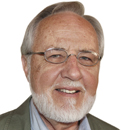 John Kane is an Emeritus Professor of Religious Studies at Regis (Jesuit) University in Denver where he taught for 30 years. He was long the Chair of the RS Department there as well as founding chair of the Catholic Studies Section of the American Academy of Religion. He has published numerous articles and reviews and one book, Pluralism and Truth, was editor of Leaven (a small journal that described itself as “an independent Catholic voice in the Rocky Mountain Region”) during its 20 year run (1990-2010), and more recently is an invited contributor to Hark, the Denver Post’s online blog on religion and values.
John Kane is an Emeritus Professor of Religious Studies at Regis (Jesuit) University in Denver where he taught for 30 years. He was long the Chair of the RS Department there as well as founding chair of the Catholic Studies Section of the American Academy of Religion. He has published numerous articles and reviews and one book, Pluralism and Truth, was editor of Leaven (a small journal that described itself as “an independent Catholic voice in the Rocky Mountain Region”) during its 20 year run (1990-2010), and more recently is an invited contributor to Hark, the Denver Post’s online blog on religion and values.

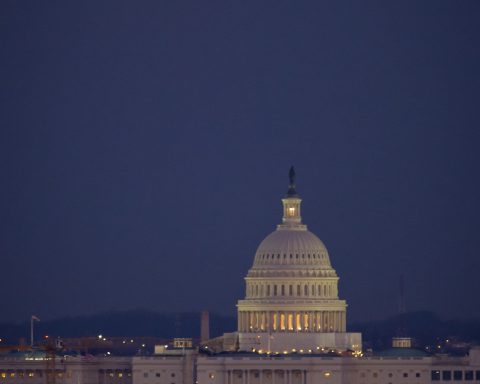

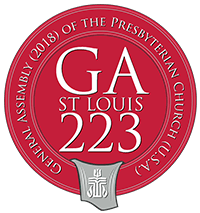
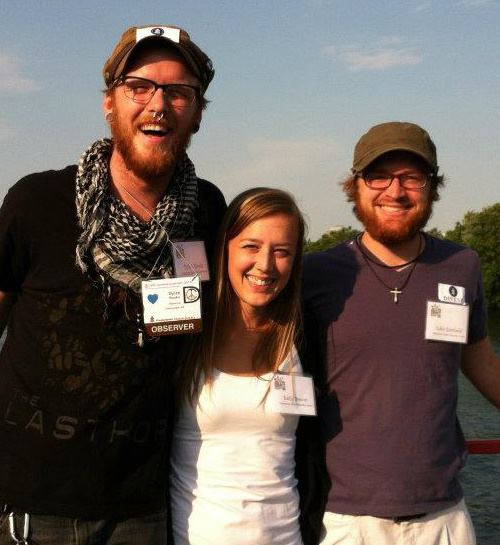
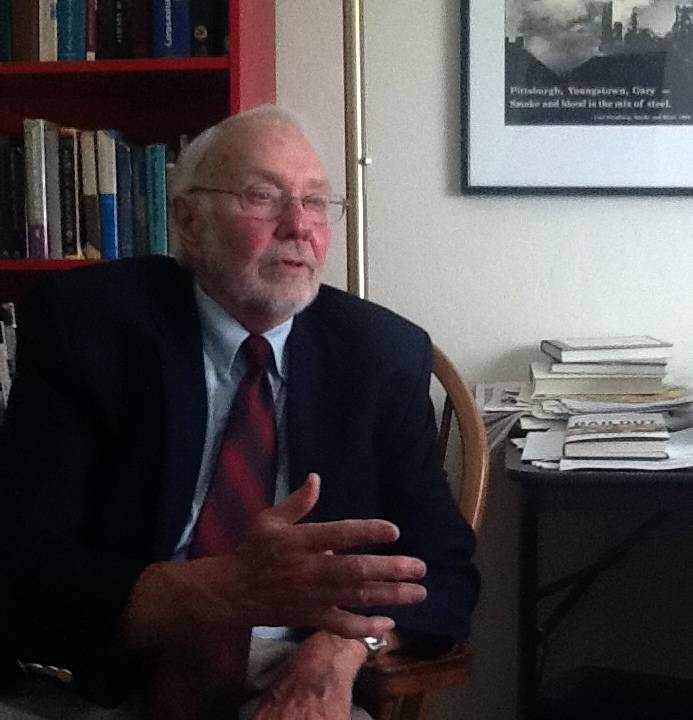
Unbound Social